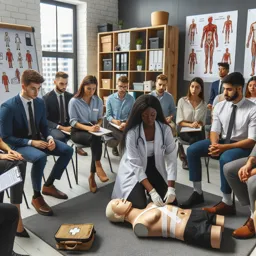Introduction to Wilderness First Aid
When adventuring in remote areas, access to professional medical care is often limited or delayed. Wilderness First Aid (WFA) equips individuals with the knowledge and skills necessary to manage injuries and illnesses that might occur far from conventional help. Whether you’re a hiker, camper, or outdoor enthusiast, understanding WFA can make a critical difference in adverse situations.
What Distinguishes Wilderness First Aid?
Unlike urban first aid, wilderness first aid addresses unique challenges such as:
- Extended hours or days before evacuation is possible.
- Lack of immediate access to medical supplies and equipment.
- Environmental hazards like extreme temperatures, wildlife, and difficult terrain.
Key Principles of Wilderness First Aid
- Scene Safety: Ensure the area is safe for yourself and others before providing help. Be aware of environmental threats.
- Initial Assessment: Quickly determine the victim’s level of consciousness, airway, breathing, and circulation.
- Stabilization: Use available resources to stabilize life-threatening conditions, such as severe bleeding or compromised airways.
- Prevention of Further Harm: Protect the injured from hypothermia, dehydration, and shock while awaiting or facilitating rescue.
- Evacuation Decisions: Know when and how to evacuate; some injuries or illnesses require immediate movement to a higher level of care.
Common Wilderness Emergencies and Responses
- Bleeding and Wounds: Apply direct pressure, use improvised dressings, and monitor for signs of infection.
- Fractures and Sprains: Splint limbs with sticks or padded clothing, immobilize, and avoid unnecessary movement.
- Hypothermia: Replace wet clothing, insulate with available materials, and provide warm, high-energy fluids if available.
- Heat Exhaustion: Move to shade, rehydrate with safe water, and cool the person with water or wet cloths.
- Bites and Stings: Clean the area, apply cold if possible, and monitor for allergic reactions.
- Altitude Sickness: Descend to lower altitudes, rest, and hydrate.
Essential Gear for Wilderness First Aid
- Multi-use bandages and gauze
- Antiseptic wipes or solutions
- Moleskin or blister treatment supplies
- Elastic wrap for sprains
- Scissors, tweezers, safety pins
- Gloves and face masks
- Duct tape (for repairs and improvisation)
- Medications such as antihistamines and pain relievers
Training and Preparation
Taking a dedicated wilderness first aid course combines classroom knowledge with hands-on practice, including improvisation skills and realistic scenarios. Additional tips include familiarizing yourself with the symptoms of common wilderness ailments and ensuring your first aid kit matches the environment and group size.
Conclusion
Wilderness First Aid is a vital skillset for anyone venturing off-grid, providing the foundation to prevent minor problems from turning into major emergencies. Through proper preparation, training, and vigilance, outdoor adventures can be both safer and more enjoyable.



























